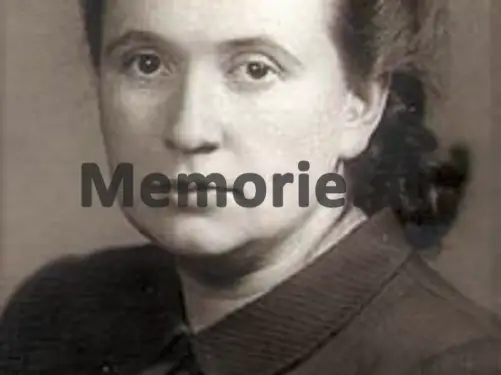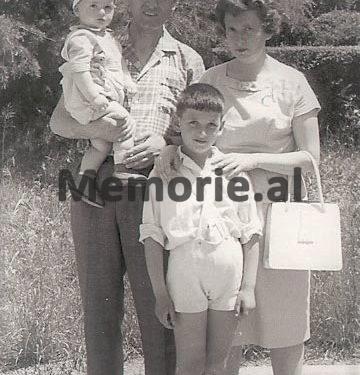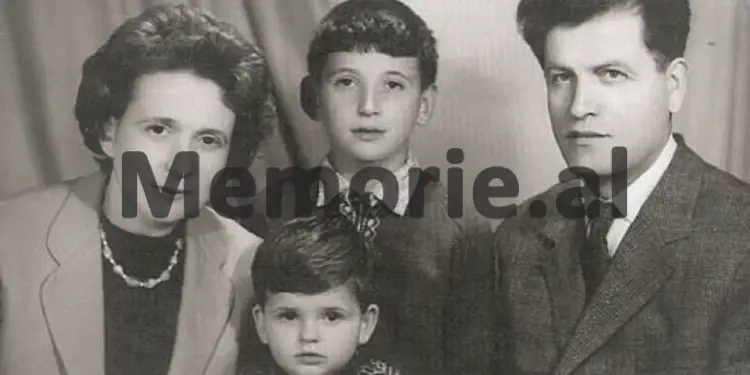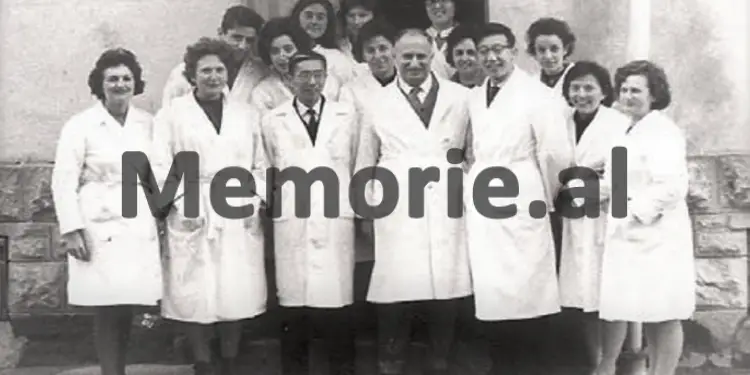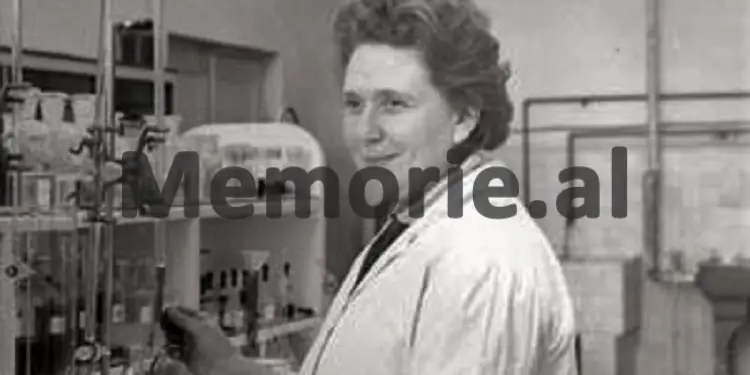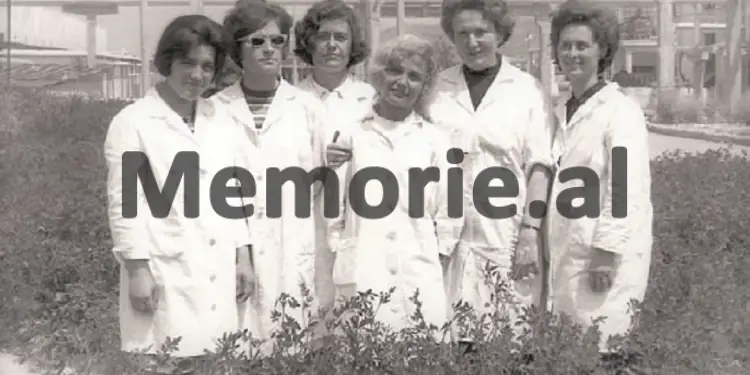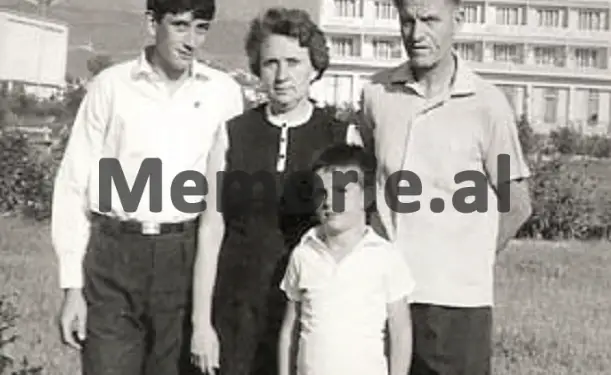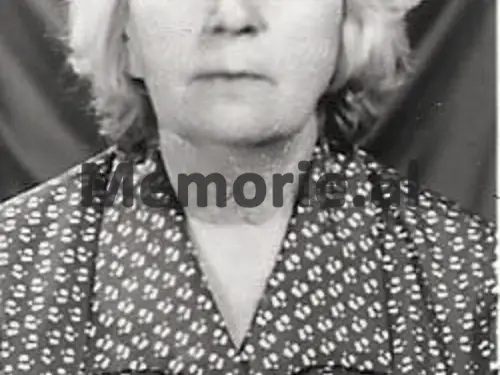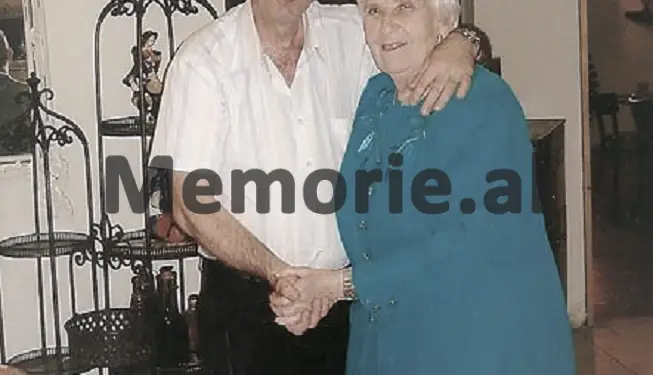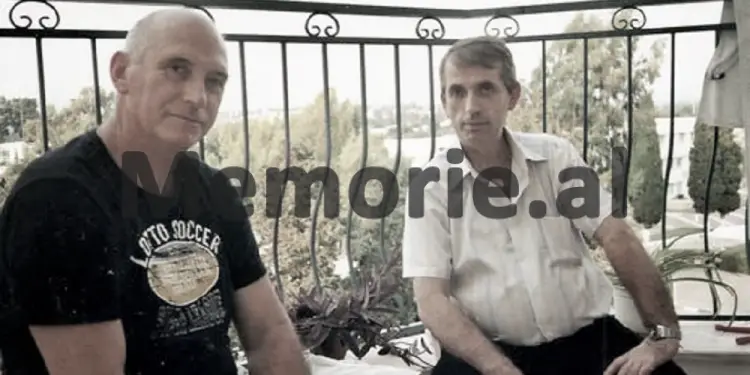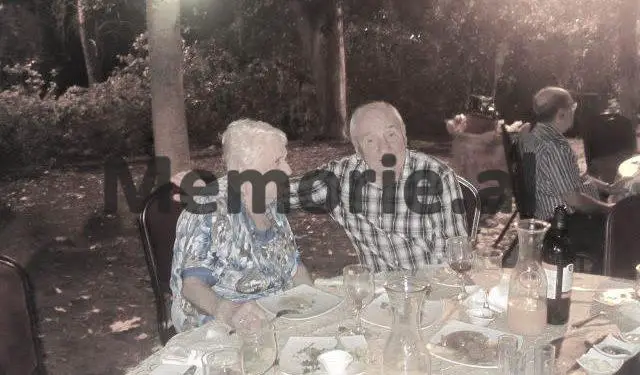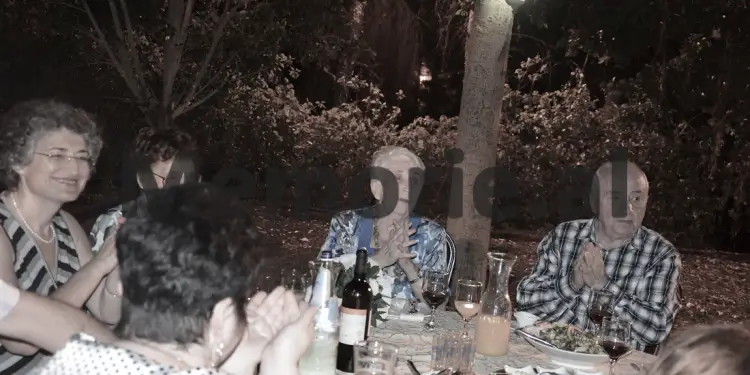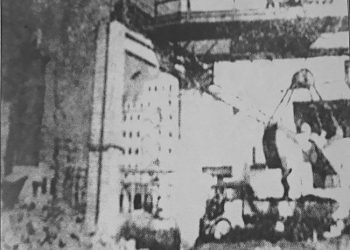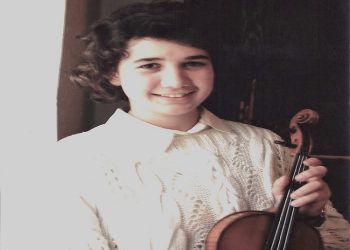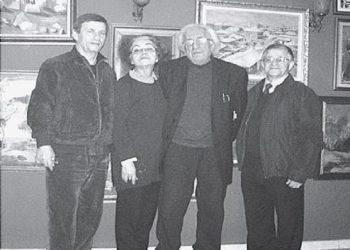By Taisa Pisha Batkina
The fifth part
Memorie.al/publikon the unknown story of the Russian Taisa Batkina (Pine), originally from Tula, Russia, the third child of a very poor rural family, who was orphaned at a very young age, after her father lost her life while working in one of the coal galleries on the outskirts of Tula, where he worked as a miner (shortly after escaping arrest, accused of “supporting the enemies of the people”) and she grew up with difficulty great economic, as their city continued to be under the bombardment of German forces, which had reached as far as near Kursk. Taisa graduated from the Faculty of Chemistry, near the ‘Lomonosov’ University of Moscow, where she met and married the Albanian student, Gaqo Pisha, originally from the city of Korça, who at that time was studying at the Faculty of Philosophy in Moscow and both together in 1957, they returned to Albania, together with their newborn son, Sasha, where they began life in the city of Tirana, Taisa was appointed as a professor of Chemistry at the State University of Tirana, while Gaqo, in the chair of Marxism- where they worked until 1976, when the State Security arrested Taisa Batkin on fabricated charges, accusing her of being a “Soviet KGB agent” and sentencing her to ten years in political prison, which she suffered. in the “Women’s Prison” in the city “Stalin”, from where she was released in 1986, while her husband, Gaqo Pisha, had died in 1983, from a serious illness. The tragic story of Taisa Batkina (Pine), in the inhuman camps and prisons of Enver Hoxha’s communist regime, where she spent a decade of her life, along with many compatriots from the former Soviet Union, or other Eastern European countries, comes through her memories, published in a book entitled “We hoped and survived”, memories which, her son, Aleksandër Pisha, kindly offered her for publication, in Memorie.al
We hoped and survived
I dedicate it to the bright memory of my husband, GAQO PISHA
This is a book of memories. In it I want to tell about my life and that of my friends, Soviet women, who tried prison for several years just because they got the courage and got married and linked their fate with that of Albanian students. The prison was part of the great GULAG in the small Balkan country, Albania, where for many years the bloody communist regime of Enver Hoxha ruled, who was a loyal student of Stalin and a follower of his cause.
Through this book I would like everyone to learn about the inhuman trials we experienced and the horrible years we spent in Albanian prisons, just because we… fell in love! And let no one ever forgets what totalitarianism, despotism is and what the consequences of this system are.
Continued from the previous issue
This world was foreign to me; it never occurred to me that one day I would enter there myself and relatives would come to wait in front of the gate…! Everything happened so suddenly and without realizing it, that my consciousness could not be reoriented, I could not fully understand that it was so: between me and all other people, the whole world was sitting an iron curtain; that everything was torn, trampled on: even my life, family, my husband, children, interests… everything. “GAZ” stopped near the iron gate, which opened quickly. We went in, we went on a little bit, a little bit, we stopped a few times, some big, metal gates opened and closed, cracked and sounded heavy bolts and latches. I was taken to a small room, where the woman who accompanied me in the car said sharply: “You are under arrest”! “For what? I have not done anything illegal …”! “They know there” – was the answer. Then the check started a serious, humiliating procedure. They took off my socks, my belt, took my bag and took me somewhere down the stairs and down a long corridor. I remembered nothing, neither hallway, nor stairs, nor doors. The guard pushed me inside into an empty niche with black plank floors. In the corner was thrown a loose straw mattress and two dirty, torn blankets. In the corner behind the door was a dirty bucket. I was barefoot, my shoes ordered me to leave them on a nightstand in the hallway; I also left my upper clothes there. Terrified and confused, I sat in the corner of the camera. And again I could not think.
The door opened, the guard shouted: “Get up! After me”! From such a cry, with which I was not accustomed, I trembled even more deeply in my soul. She ordered me to put on a pair of slippers and dragged me through the long corridors until we entered a room. Inside was a man. I do not remember his face, I do not even know if it was my investigator or someone else. He handed me a piece of paper: “Sign here, it is the arrest warrant.” I managed to read: “Agitation and propaganda”. As if I was somewhat relieved. But I have known for a long time that the Security organs could make any innocent person a spy, a terrorist, a saboteur. There were many people in the country who still believed that they arrested only the guilty, the real enemies. Here I want to emphasize that Albanians are smart, reasonable people, they do not give in easily to suggestions or deafening propaganda. Most of them understood very well, they knew, but they pretended, as if they believed everything, approved and supported everything. The belief that I was just a fly, tiny, tiny, that with me and my family they could do whatever they wanted, paralyzed me, oppressed me. I saw it, I knew that lawlessness had long since taken the place of lawfulness, that justice had not existed for a long time. I did not even think about it, this conviction had entered the blood and flesh. It was half dark in the cell where I was returned. Somewhere up there was a small window with bars, without glass. In the evening they turned on the light. I was afraid that night would come, they would turn off the light and in the dark it would be even more frightening. I did not know then that in prisons the lights do not go out, that over my head for many, many nights, a small lamp would light up, illuminating the bare walls, the door, the small square of the window. This light is anxiety; you cannot protect yourself from it.
The prison, once built by the Italians, had very high ceilings… up to 5-6 meters. The electric wire was up, the prisoners could not reach it, if at any moment of despair the desire to end life came to their minds, while at night you did not know where to enter from the light, which would not let you rest. The light tortured us even in the camp. There the ceilings were low and the seats in the upper beds were considered better. There was more air there, but all night long the light killed his eyes, the cold, heartless light that penetrated every ray. I remember how occasionally the light in the camp burned, and we rejoiced in the darkness, going out into the courtyard and gazing at the bright stars of the South, which were not usually seen by the strong light. But all this would come later, and now I was sitting on the dirty floor and I could not recover. The door opened, I was handed a bowl with horrible faces; I ate two tablespoons, not that I ate it, but… enough to carry out the order, quite mechanically. “Go to the bathroom, take the bowl and wash”! Dirty toilet, everything old, broken and inadvertently going to mind, to the thousands of unfortunates who had been there. That night and all the days and nights that followed, I was tormented not by disaster but by something far worse: without credibility and without knowing what was happening. The misfortune is frightening, terrible, but it does have a name, and what was happening to us was utterly meaningless. It was a nightmare, which in no way could be justified. After the first shock, which deprived me of the opportunity not only to judge, but also simply to think, the thought went home to me, to my dearest, closest, dearest people. How are they… because they have it so heavy, it’s hard to imagine. Even now, when more than 20 years have passed and I start thinking about the past, my eyes fill with tears and the pen refuses to write. I imagined how strangers were treated at home, when only my seriously ill husband was there, and after being told that I had been arrested, they started rummaging everywhere, throwing everything here and there, checking everything. What were they looking for? Surely a radio broadcaster?! At home we had only an old radio with lamps, with which you could only hear Tirana. They gathered in a bag all my letters and pictures (I had done the stupid thing, I had kept all the letters coming from home and friends), a whole bundle was piled up, which they put in front of me during the investigation. As the boys later told me, the security guards left after closing and sealing the small room, where my beloved library shelves were, where my sons slept and did their homework. Costa, the little boy, came back from school and downstairs a friend was waiting for him; they would go to the chess circle. Costa came in and met the eyes of the haunted father. Gaqoja told him: “They arrested my mother”. Costa found the strength to go up the stairs, to say to his friend: “I will not come”! And to return home. Then came Sasha University. Hard to describe his condition.
This is only in general terms, because both I and my children did not want to dig into the past. I stayed and wondered in the cell, how they would live without me. Gaqo was very ill, he needed care. Costa was still young, only 14 years old, excellent student, cheerful boy, the youngest, the playful of the family, spoiled by the care and attention of all. Po Sasha! They will persecute him; they will not let him work. Gaqo’s mother was very old, close to 90 years old and could not help them. (Six months later she died, probably without realizing what had happened to me). Even before I was arrested, I was overwhelmed with fear. Now just to think about it, just to ask it throughout the investigation. I was afraid that they would be taken out of the house, or expelled from Tirana, interned. In the cell, during the investigation, I had such a dream: “We are expecting guests in our house. Everything is ready for their arrival: cakes, pies, biscuits, chocolates are lined up in the cupboard; my people wander around the house and wait for friends to come. And the guests, Gaqo’s brother’s family and some other families of close people and our friends, go around the house and cannot enter… and did not come… ”! I was surprised by this dream, and one of the Albanians, when she heard it, interpreted it like this: “It is quite simple: your house is full of grief, and relatives and friends cannot come and share with you the evil that you “They want to, but they can’t.” Yes, the dream truly reflected what was happening.
Later, in the camp, after going through all the circles of hell, investigations, trials, I realized and I think I was right: our people, beyond the bars, had it harder than us. If we here were all equal, all equally suffering, equally humiliated, they in freedom felt much worse. They suddenly and without remembering became declassed. Most turned their backs, got scared, avoided. Costa, the best student of his 7th grade, jockey, participant in all school activities, competitions, evenings, activist, suddenly became “son of the enemy of the people”! One wonders how much this tormented the boy. Although he finished the 8-year-old with excellent grades, Costa was not allowed to enter the Teknikum during the day. He enrolled in the gymnasium, but to get a profession and started working and continuing school at the Teknikum… at night. Sasha was not allowed to continue University. He was forced to work as a simple farm worker, and then taken over as a soldier. During all this time, during the year and a half that my investigation lasted, I was lied to without shame; they told me that in my family everything went for beauty! And I trusted them… I wanted to believe, and I believed. In fact, the family was in a difficult situation and lived very close. After taking Sasha as a soldier, they also experienced hunger, because with my husband’s small pension they helped me, Sasha in the army, buy expensive medicine for the sick Gaqo, and live on the crumbs that remained. The situation beyond the bars was terrible. Arrests continued, people were interned, fired, expelled from university. Security forces were scattering on all four sides all sorts of nonsense about spies, saboteurs, enemies. There was also talk of radio transmitters that they had allegedly found in our homes.
In the magazine “In the service of the people”, a body of the Ministry of Internal Affairs, articles were published about the brave Albanian “Czechs”, who stand in the security of the state and uproot the rebels. Anyone who communicated with our families in any way and tried to help them risked being included in the circle of persecuted people. This was the source of fears and espionage, as a means of survival, the Czechs – the State Security forces in the Soviet Union, during the first years of the revolution, known for the brutality and repression of those years (translator’s note). Spying matches everywhere: at work, at home. People forced them to spy on their relatives as well, or, at best, not to communicate with those who had gotten into trouble. All the time of my investigation, the trial, passed in fear for my family. Because of this fear, I lost the ability to think, reason, and calmly assess the situation. In prison, during the investigation, the second day after the arrest, the knob behind the door moved with terrible grunts, the door opened and the guard shouted: “Take the loot”! I did not know what luggage I had to collect. She pushed me headlong, nodding at the mattress, blankets, and water gourd. After I gathered them all, she led me down the hall, stopped at a door, and pushed me inside. There I saw a woman about 35 years old, I do not remember what they called her… she had a Greek name, or Parashqevi, or Polyxen… I do not even remember her face. If I met him now at the same age, I certainly would not know him. In those early days of the investigation, when I had not yet lost the ability to reason, I realized that the woman was a spy and I had nothing to talk to her about. I was scared, but I could not think of anything but home. I thought about my sick husband, about the boys. They were left alone, they had no money. We lived with difficulties, from my salary to his pension… now, how will they live with that small pension… they had to buy expensive medicine too. Po Sasha? How will his life go…?!
I only thought about them, I only talked about them. For any questions they asked me during the investigation, I spoke only to the house. Ever since the first interrogation, I asked to write an authorization on behalf of the boy, to receive my salary. I knew there was no money in the house. What a savage, ruthless monster the system and its State Security organs must have been, to put me in jail, to separate me from my seriously ill husband! They knew very well that I had done NOTHING wrong, I was not guilty. This is where the conclusion can be drawn: they can do whatever they want to me, sue me for everything, and give me any punishment. A few days later, my neighbor knocked on the wall and started telling me about something they had allegedly given her from the cell next door. I trusted him. It did not even occur to me that everything was rigged. “Wow! – the neighbor said, – there is Nina Pumo”! “Like that? Knock! Ask how it is”! – iI prayed. She knocked and started telling me about Nina. A few days later, after the next knock, she told me that Nina is accused of espionage; her group includes Nadja and Zoja. I was terrified. “Nadja ?! What does Nadja do here? Nadja has long been sentenced to 7 years for agitation”! The neighbor knocked on the wall and received an answer from there: “Nadja was brought from the camp; now accuse him of espionage. “They have accepted and signed them all.” Only later, when they took us to the camp and I met Nina, she told me that she had never been in the cell next to me and did not know how to knock on the wall, so she never knocked, while my neighbor acted on behalf of the investigators. They wanted to scare me and achieved their own. I was convinced that the investigators could do whatever they wanted with me, accuse me of anything they wanted. I was absolutely sure that none of my friends had ever been involved in espionage.
We stayed in Albania, just for the sake of our children and families. Soviet specialists and advisers, until the breakdown of relations, worked in all areas of life in Albania, in the Army, in Industry, in finance… everywhere. They had complete information about the situation in the country, they were able to recruit real, valuable spies and agents, which I believe they did. I did not know anything about these either then or now. But these spies had to be searched, they had to be found, and this was not very easy. And so… arrest, arrest, intimidate, threaten, torture and… the work is over, the network of agents was discovered…! Decorations and glory to the brave Albanian Czechs, to the insurance companies! And for little people, for their children, for men, no one will even know. Man is a… nothing…! A few days passed. The neighbor again communicated at length with knocks on the wall with the cell from our left, then told me: “The trial took place and Nadja was sentenced to 18 years in prison, Zoja to 15, and Nina to 14”. I cannot tell the horror that overwhelmed me. Even now, when so many years have passed, every time I remember that time, a wave of horror strikes me again. Now there is no need to be afraid, everything is left behind, but the torture with fear is terrible, its traces and shadow remained for a lifetime. I felt like a helpless cockroach, on which the communist tyranny crashes like a concrete block. After a few days, my neighbor was removed from my cell, thus beginning the epic of the initial imprisonment, which lasted almost a year and a half. If you allowed someone outside to open the window of my cell and look inside, he would see a half-dark creature, between four walls, sitting on a dirty straw mattress and with a window high enough you would never be able to look outside and see what is happening there; with a locked door and a padlock, which was opened only three times a day for personal needs and for food. He, for sure, would be left wondering how it is possible that the prisoner is still alive and has not ended his own life.
But man very often survives even in extreme conditions. Days pass one after another and he gets used to this terrible life. Cell! It was… a stone well, with an area close to 5 square meters and 6 meters high. The well was empty, with plank floors; there sleep. Very high above the floor a small square window with bars, without frame and without glass. From there, little light entered during the day, and on sunny days, a spot of light moved through the wall in front of it. Given her position, I learned to determine time without error. I tried to take advantage of that little ray of sunlight, move around the cell and draw my face in front of it, sucking in drops of fresh air from the window. From there in summer more hot air was introduced, and in winter cold frost. But, anyway, it was fresh air. The day started with noise and clothes. In the morning with a slap in the face, the service officer changed shifts, then the noise of the doors opening, performing personal needs. We drank a little warm tea, without sugar and soaked the crust of bread in it. And so began the long day of stifling silence. /Memorie.al
The next issue follows




